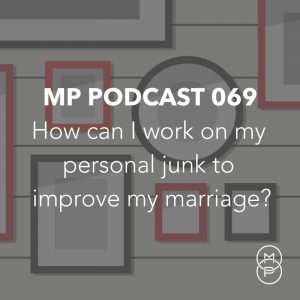About Our Guest
 It’s no surprise that we all carry some baggage into our marriage and that can spill into our marriage. To talk about this we interviewed Dr. Matt Turvey.
It’s no surprise that we all carry some baggage into our marriage and that can spill into our marriage. To talk about this we interviewed Dr. Matt Turvey.
Matt is the director of Winshape Marriage, a retreat and conference center located in North Georgia. Matt holds a doctorate in clinical psychology and has been married to his wife Nicole for 22 years and they have four kids.
Interview
Can you tell us a little about yourself?
I’ve been married to my wife Nicole for a little over 22 years. We have four kids—ages 17, 15, 12 and six.
Seven or eight years ago, we moved to Lima, Peru to do counseling for missionaries. My dad found out that House Hunters was filming, so we applied. The show came to Peru and shot us for a few days. We were international superstars for a few minutes.
What is Winshape?
Winshape started about 35 years ago by Truett Cathy, the owner of Chick-Fil-A. It started with a college leadership program and has branched into foster homes, a retreat center, teen ministry, and camps around the country.
The latest is Winshape Marriage, which started about 16 years ago. I get to direct that, and it’s so fun. We serve couples at whatever stage they’re in—whether they’re trying to get ready for marriage, looking for encouragement, a blended family, or have a kid with special needs. We have things around sexual intimacy, empty nesters, and couples who are really stuck. We have deep dive intensives to look at what is keeping couples from having the marriage they want to have.
Most people think of a ‘capital ‘T’ Trauma’ as a rape or seeing something life threatening or tragic. The ‘little-t traumas’ are the ones where you’re there and not quite sure what you experienced – messages you got from your parents that you interpreted wrongly. Most people have parents who care for them in the best way they know how and they bring their own ‘little ‘t’ traumas’ to the table and act the best out of what they know.
How does the need to perform in marriage have an impact?
Because I wanted to be such a good husband, I did everything I could to be a good husband. It got me by for about ten years and we realized that more than trying to have a deep relationship we were trying to have a relationship free of conflict.
I was doing my graduate work for Gary Smalley and attended my first marriage intensive. I realized for the first time that I had never let my wife have a negative emotion around me because it meant I was a failure.
When I saw it in this process, I realized I had squashed her. I came home and tried to see her comments (eg. the yard needs to be mowed) as not being about me. I was turning the fingers around at her and always had an accusatory posture that belittled her.
How does our personal baggage come into marriage?
A philosopher once said, “the unexamined life is not worth living.” If you don’t examine and take the deep dive into stuff that you bring to the table, you’re just going to repeat patterns. In some ways, we’ve just learned to survive and it may not be the best way.
People bring the old stuff into marriage and it works for a while, but you’re not really succeeding in a safe, deep, intimate way with your spouse. When we look and see how we’re connecting with our spouse, we need to ask if there is a better way. When people ask those questions, they may be surprised at the answer sometimes. But if you look a little deeper, you’ll find a new level of intimacy in your marriage.
How do we properly deal with trauma in marriage?
I remember the first time I went to counseling for stuff I recognized as a problem for my marriage, it literally felt like I was standing on the edge of a cliff and looking down. There was the other side of the cliff that was health, and I had no idea how to get there.
I didn’t know there was a safety net and when I took the first step of faith God had me. As I got deeper and deeper into my wounds, I realized that I liked myself and could trust myself. There were some truths about myself and who God created me to be that helped me come to my marriage from a place of health.
How often do struggling couples have unresolved problems?
You start out as an individual in marriage so probably the vast majority of stuff is individual. The difference between your expectations and reality is where the disappointment is. But far and away when I start looking at things from a different lens in my marriage, 95% of stuff gets taken care of.
How often are responses directed at the spouse instead of what they can improve?
I get calls from people who want to come to intensives and they’re not saying it so much but they’re basically saying, “My spouse is nuts, can you fix them”. We have to start with ourselves first. If we can help individuals look at what they bring to the table and then we show up out of a place of health and wholeness you’re really able to grow.
Over the years, I’ve come to realize that most of us in our marriage actually have what it takes. I believe in people who come to counseling. I believe in the innate ability of people to show up and remove the junk that overlays their heart—deep down we were created to love and be attached to other people and our savior. We want to set the stage for that to happen.
What is the Prodigal Love program?
This is the first time we’ve done a marriage experience for individuals. Our marriage retreats for years have been you and your spouse come together—that works and that’s awesome. But like we’ve been talking about, you need to do your own stuff first.
Prodigal Love is all about that. We’re bringing in a program with some Christian therapists. We call it a personal growth intensive. It helps folks slow down, get rid of their cell phone, and be in a small group setting where you have the chance to take that dive off the cliff. It sounds like a scary experience but the people who are walking you through it are extremely safe. When you get in that process you’re going to find some healing. If you trust the process, change will happen.
I’ve been through it myself and I can tell you it was the first time in my life where I felt the grace of Jesus in my gut, in a way I had never experienced before. It was powerful and I’m hoping we can recreate a sense of that experience for people who come.
What transformation have you seen from programs like this?
I went through a process very similar to Prodigal Love. About six years ago, we adopted a beautiful little girl from China. When she came home I was an angry man at a beautiful little two and a half year old girl from China and I had no idea why.
In the process I found Onsite, the process we use in Prodigal Love. And not once in the process did we talk about me as a dad. We started going back and looking at the messages I had received in life early on. What we began to realize was me being loved for performance was there. In one exercise we did called a psychodrama where you ask people to play a role for you and you talk to them.
That exercise changed everything for me. I experienced the grace of Jesus and heard him say, “I delight in you”. When I experienced that grace. I became a better father, husband, and boss.
Your one simple thing this week:
I hope people recognize that the struggle with God is okay. Don’t run from it, look at it and ask what it is. Ask for wisdom when you need it.
Show Closing
Thanks for joining us for the Married People Podcast. We hope you’ll subscribe to the podcast on iTunes and leave a review – they help us make the podcast better. We want to hear from you! Share with us on Facebook, Instagram or our site. If you want more resources, check out the MarriedPeople membership.
For more from Dr. Matt Turvey, check out his Facebook, Twitter and LinkedIn. You can find more about Winshape on their website and the Prodigal Love Retreat on their website. Finally, we hope you’ll join us for next week’s episode!





